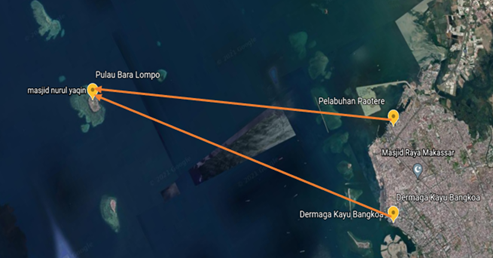Study of Makassar City – Barrang Lompo Island Sea Transportation Tariffs During the Covid-19 Pandemic
Main Article Content
Abstract
The Covid-19 pandemic has caused the Indonesian government to restrict the movement of communities to prevent the spread of the Corona Virus. This regulation has been enforced by the local government of Makassar City as well. The restriction affects the community's economy, which includes business activities related to population movement. Similarly, the restriction impacts the sea transportation in Makassar City, particularly the Makassar-Barrang Lompo route. The limitation of the passenger-carrying capacity to 50% of the maximum ship carrying capacity and the limitation of working hours have caused a decrease in the productivity of sea transportation on this route. In addition, the population movement on the Makassar – Barrang Lompo route has declined, causing the demand for sea transportation to decrease as the number of service frequencies decreases. It directly affects the revenue of sea transportation. As the tariff applied during the pandemic RP. 25,000, this study aims to determine the minimum tariff for operating ships so that it can be seen with the decreasing productivity and number of ships frequency, whether the applied tariff can cover the operational costs of the ships. Determination of the minimum tariff using the Required Freight Rates (RFR) method. RFR is the minimum rate that can cover the expenditures related to ship operational activities. The result shows that the minimum tariffs for the six ships operating during the Covid-19 pandemic were Rp. 11582 – Rp. 32,486. This indicates that the minimum tariffs of some operating ships are still higher than the applied tariff. Therefore, the ship fares on the Makassar-Barrang Lompo route need to be reviewed if the policy of restricting people's movements is reenforced.
Downloads
Article Details

This work is licensed under a Creative Commons Attribution 4.0 International License.
Allow anyone to modify, improve, and make derivative works, even for commercial purposes, as long as they credit to you for the original work.
References
Jinca, M. Y. 2011. Transportasi Laut Indonesia. Brilian International. Surabaya.
Nababan, Vatresia Oktaviani 2017. Analisa Kelayakan Tarif Penyebrangan Kapal Ferry Trayek Garongkong – Batu Licin. Skripsi Universitas Hasanuddin. Makassar
Nasution, H.M.N., 2008. Manajemen Transportasi. Ghalia indonesia. Jakarta.
Nasution, H.M.N., 2004. Metode research: Penelitian Ilmiah. PT Bumi Aksara. Jakarta.
Peraturan Menteri Perhubungan Republik Indonesia Nomor PM 66 Tahun 2019 Tentang Mekanisme Penetapan Dan Formulasi Perhitungan Tarif Angkutan Penyeberangan
Peraturan Menteri Perhubungan Republik Indonesia Nomor PM 84 Tahun 2018 Tentang Jenis, Struktur, Dan Golongan Tarif Jasa Kepelabuhanan,Serta Mekanisme Penetapan Tarif Dan Jasa Kepelabuhanan Pada Pelabuhan Yang Digunakan Untuk Melayani Angkutan Penyeberangan.

